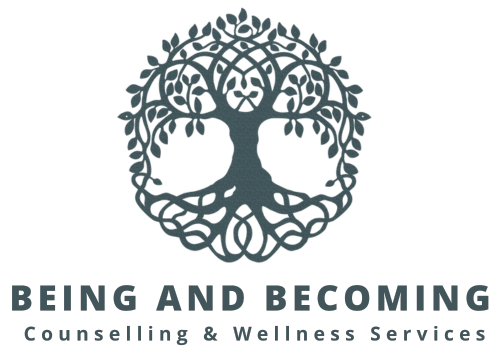BEING AND BECOMING COUNSELLING AND WELLNESS SERVICES
Cognitive Behavioural Therapy (CBT)
A proven and practical approach that helps you break free from unhelpful patterns and create meaningful change.
CBT can help you:
IMPROVE MOOD
DECREASE ANXIETY, WORRY & PANIC
IMPROVE SLEEP
Are negative thoughts running the show?
When faced with challenges, do you immediately assume the worst will happen or find yourself thinking "I can't handle this" before you've even tried? Maybe you replay past mistakes over and over, avoid situations because you're convinced something will go wrong, or get caught in spirals of "what if" thinking that leave you feeling paralyzed.
Cognitive Behavioural Therapy helps you break free from these automatic patterns and navigate life with greater ease.
Cognitive Behavioral Therapy (CBT) is an evidence-based therapeutic approach that focuses on the connection between thoughts, feelings, and behaviours. It has been extensively researched and proven effective for treating a wide range of mental health concerns including anxiety, depression, insomnia, OCD, eating disorders and more.
COGNITIVE BEHAVIOURAL THERAPY IN BURNABY AND ACROSS BC
What is Cognitive Behavioural Therapy and How Does it Work?
CBT helps you understand how your thoughts, feelings, and behaviours interact — and how making changes in one area can positively affect the others. It is a practical, skills-based approach to therapy that focuses on identifying the patterns that keep you feeling stuck and learning new ways to respond to life’s challenges.
It helps you notice unhelpful thoughts — like “I’ll never succeed” — and see them as interpretations, not facts. You’ll also explore behaviours that may reinforce distress, such as avoidance or overworking, and experiment with new, more helpful actions. With support from your therapist, you’ll develop practical tools to challenge unhelpful thoughts, try new behaviours, and build healthier habits. Practicing these skills in daily life — for example, through thought records, behavioural experiments, or mood tracking — helps you respond to challenges with more clarity, flexibility, and confidence.
Change is possible. We can help you get there.
What to Expect in Cognitive Behavioural Therapy
-
1. Assessment & Formulation
In early sessions we’ll explore your current challenges, go over your history, clarify your goals, and collaboratively build a map of how your thoughts, feelings and behaviours interact.
-
2. Psychoeducation
We’ll introduce the CBT model, help you recognize your patterns of thinking and behaving, and learn how they are maintaining the problem.
-
3. Skill-Building
You’ll learn cognitive skills (such as identifying automatic thoughts, challenging distortions, generating alternative thoughts) and behavioural skills (such as exposure to avoided situations and behavioural experiments).
-
4. Homework / Between-Session Tasks
You’ll be given tasks to practice between sessions (for example, thought records, behavioural experiments, monitoring your mood/behaviour, trying a new behaviour).
-
5. Review & Progress Tracking
Each session we’ll review what worked/what didn’t, refine the approach as needed, adjust goals, and celebrate progress.
-
6. Relapse Prevention & Termination
Towards the end of therapy we’ll plan for how you can maintain gains and manage future setbacks independently.
Challenges CBT Can Help Address
Persistent worry or anxiety
Panic attacks
Depression or low mood
Negative self-talk
Obsessive thoughts
Compulsive behaviours
Social anxiety
Perfectionism
Procrastination
Sleep difficulties
Anger management issues
Low self-esteem
Benefits of Cognitive Behavioural Therapy
As you engage in CBT Therapy, you may begin to notice improvements such as:
Reduced anxiety, worry or panic symptoms
Improved mood
Increased confidence and self-esteem
Enhanced coping skills
Better problem solving abilities
Improved sleep quality
Improved relationships
Better emotional regulation — more stability, fewer reactive spirals
Greater resilience — being able to bounce back from setbacks
-
CBT sessions are structured and collaborative. You and your therapist will work together to identify specific issues, examine the thoughts and beliefs underlying them, and develop practical strategies for change. Sessions typically involve discussion, skill-building exercises, and planning homework assignments to practice between sessions. Your therapist will create a safe, supportive environment where you feel comfortable exploring your thoughts and experiences.
-
CBT is typically a shorter-term therapy compared to other approaches. The length varies based on your individual needs and goals, but many people see significant improvement within 12-20 sessions. Some concerns may require fewer sessions, while more complex issues might benefit from a longer course of treatment. Your therapist will discuss a treatment plan with you and regularly review your progress together.
-
Progress in CBT is typically measurable and observable. You might notice reduced symptoms of anxiety or depression, increased ability to manage difficult emotions, more balanced thinking, improved relationships, or greater confidence in handling challenging situations. Your therapist will regularly check in about your progress and adjust the treatment approach as needed. Remember that progress isn't always linear—some ups and downs are normal.
-
Practice between sessions is an important part of CBT, as it helps you apply what you're learning to real-life situations. However, homework assignments are collaborative—you and your therapist will work together to create exercises that are manageable and relevant to your goals. If you're having difficulty with assignments, your therapist will work with you to adjust them to better fit your needs and circumstances.
-
Yes. Research shows CBT is effective for many disorders including anxiety disorders, depression, eating disorders, and more.
-
CBT has strong evidence supporting its effectiveness for many concerns, particularly anxiety disorders, depression, trauma, OCD, and stress-related issues. However, every person is unique, and what works for one individual may not be the best fit for another. During your initial sessions, your therapist will assess whether CBT aligns with your needs and goals. We can discuss your specific concerns and determine together if CBT is the right approach for you.
Below are commonly asked questions about CBT:
Common Questions about Cognitive Behavioural Therapy
Therapists Offering Cognitive Behavioural Therapy (CBT)








